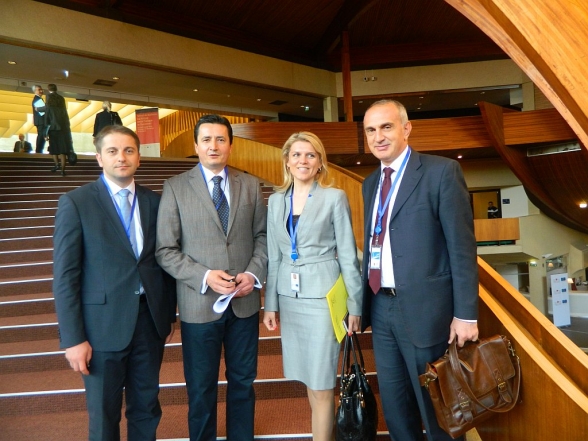On the third working day of the PACE, at the morning part of the Plenary Session, the following four resolutions were considered and adopted: Resolution prohibiting violence against religious communities, Resolution on culture and education through national parliaments: European policies, Resolution “Young Europeans – an urgent educational challenge” and Resolution on Young people access to fundamental rights.
In the Resolution prohibiting violence against religious communities, by the rapporteur Mr. Luca Volontè, there was concern over increase of violent attacks against religious communities across the world. The frequency of physical as well as psychological violence against individuals and the communities had been pointed out. The Parliamentary Assembly had been continuously pointing out the importance of respecting freedoms of conscience and religion, as stated under the Article 9 of the European Convention on Human Rights and Freedoms as well as the Article 18 of the General Declaration on Human Rights. Member states of the Council of Europe encourage, among other things, observation of human rights, democracy and civil freedoms as a common foundation upon which relations with the third countries are built, ensuring that the democratic clause, including religious freedoms, follows inclusion in treaties with third countries.
Resolution on culture and education through national parliaments: European policies have caused major interest among the members of the PACE. It was pointed out in the Resolution that the national parliaments hold a key role and important responsibility for promotion of policies of education and culture. This type of policy should not only encourage development of employment, aimed at competencies, but should also promote ethnic and political values relating to the key goals of the Council of Europe. Important progress had been made in establishing legislative framework aimed at fighting against exclusion and discrimination with regard to access to culture and education. Nowadays, the main challenge lies in the effective implementation of the relevant legislation. National parliament should also intensify its work on promotion of intercultural dialogue and encourage cultural and educational exchange across the border, removing administrative obstacles. With that in mind, the Committee on Culture, Science, Education and Media has invited national parliaments to review the policy of culture and education, emphasising the long-term perspective, to undertake measures for implementation of policy agreed upon at the Council of Europe level, regularly evaluating impact of the state action in the field of culture and education. The report also highlights the importance of promotion of the European framework for competencies of democratic citizens, human rights and intercultural dialogue and it is required for this framework to be a part of the Activity Programme of the Council of Europe in the upcoming two-year Session. It has to be directed towards employment but also encouragement of talents, creativeness and skills for them to be included in the development of sustainable society. The Report requires from Member States to adopt comprehensive approach to education as well as to overtake measures in determining political framework, create new possibilities for learning, improve the current ones, enable inclusion and greater number of young who deal with their own learning and development. Special measures on European level should be overtaken, especially regarding strengthening of the approach to education for people from disadvantaged groups as well as encouragement of non-formal education and insurance of wider recognition of competencies acquired by non-formal manner of learning, following the proposals of “Strasbourg process” – joint initiative of the Council of Europe and European Commission.
In the Resolution “Young Europeans – an urgent educational challenge” by the rapporteur Ms. Polonca Komar, it was pointed out that education is essential for empowerment of the young, as well as for their personal fulfilment.
Resolution dealing the approach to fundamental rights of young, by rapporteurs Mr. Michaela Connatry and Mr. Luka Volonte, it was emphasised that in spite of existence of several international mechanisms of human rights relating to young people, it seems that a special legal instrument for human rights which includes social, economic and political rights in order to ensure their complete protection is necessary. The Report advocates for framework convention at the European level which would improve the approach of young to their fundamental rightsand invites to the improvement of intergenerational dialogue; paying of greater attention to proposals of young people, as those forwarded from representatives of young at Ninth Conference of Ministers Responsible for Youth, at the Youth Parliament and at World Forum on Democracy, during 2012
Political dedication and adequate provision of the budget are necessary for strengthening the participation of young in decision-making policies at the national level, for example, through participation structures in national parliaments and government as well as on international plan, through pan-European international organisations.
MPs participated in the work of the Socialist Group, as well as in the work of the PACE Committee.
The Head of the Delegation of Montenegro Mr. Zoran Vukčević PhD participated at the meeting of heads of delegations with the PACE President, Mr. Jean-Claude Mignon.
Members of the Delegation had a meeting with co-rapporteurs for Montenegro, Ms. Nursuna Memecan and Mr. Kim Sassy, and the topic of the conversation was organisation of the following visit of co-rapporteur for Montenegro achieved regarding the Resolution from June 2012. Also, the topic of the Meeting was “Reports of the PACE observation mission on parliamentary and presidential elections in Montenegro”.
Members of the Delegation attended the reception on the occasion of 50th anniversary of membership of Switzerland, organised by their Delegation.








